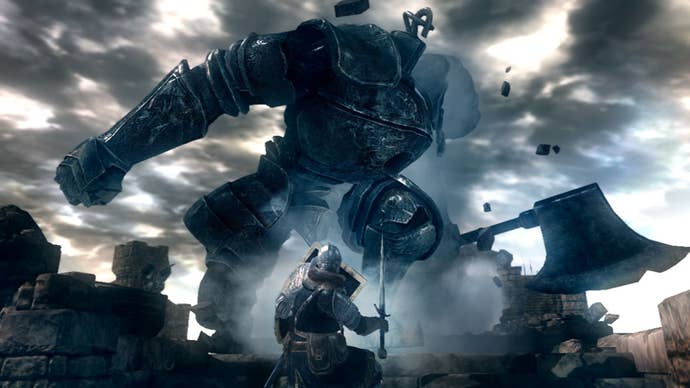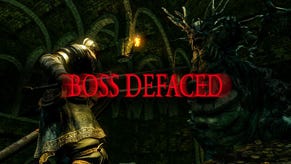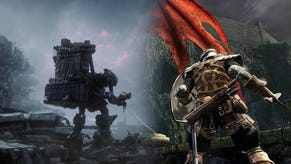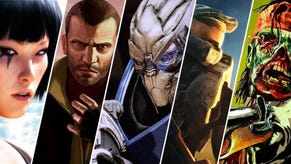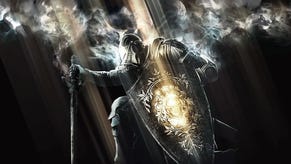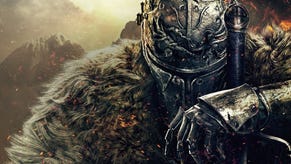The 15 Best Games Since 2000, Number 1: Dark Souls
Praise the Sun!
This article first appeared on USgamer, a partner publication of VG247. Some content, such as this article, has been migrated to VG247 for posterity after USgamer's closure - but it has not been edited or further vetted by the VG247 team.
This concludes our daily countdown of the 15 Best Games Since 2000. Want to read the rest? Check out the rest of the entries here.
Kat Bailey, Senior Editor
"Dying matters," FTL co-creator Matthew Davis says in a 2012 interview for the book Anything But Sports: The Making of FTL. As his partner Justin Ma subsequently points out, it brings with it a sense of impending doom that naturally raises the stakes when making an important decision. Few games understand this better than Dark Souls, one of the most impactful games of the past fifteen years.
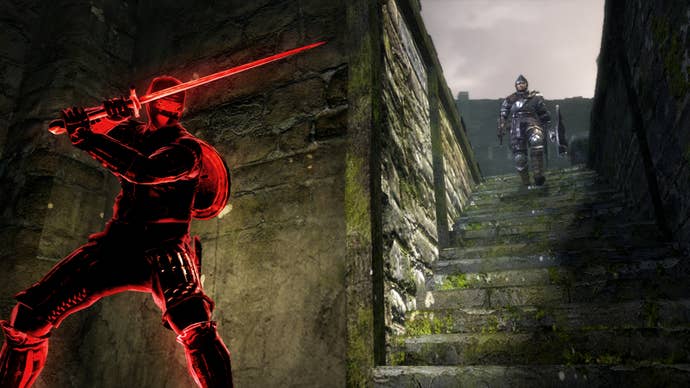
Davis and Ma were speaking in regards to roguelikes, where death is famously permanent. That is not the case in Dark Souls, but it still has some pretty major consequences, among other things removing your humanity and forcing you to recover lost currency. That approach has put it at odds with the conventional wisdom of modern game development, which is to make an experience as accessible and pleasurable as possible. You might call it the anti-Triple A.
Easy as it is to sum Dark Souls up in those terms, though, it also does it a disservice. It is not hard for the sake of being hard. Rather, it is one of the most meticulously crafted games I have ever played. It is a game with such beautifully designed levels that they align almost perfectly in a 3D map viewer. It demands mastery.
Bob put it best when he remarked in another piece, "Every time I return to the world of Lordran, I somehow pick up on something new: a background detail, item description, or mechanical element that managed to escape me in the past—that's incredibly impressive for a game that's already eaten up over 200 hours of my life. For example, this time around, I learned if you somehow lose all of your stamina while on a ladder (an incredibly rare occurrence), your character will fall backwards off of it and comically flail to the ground. It's a tiny, insignificant detail that doesn't affect the game much, but still, something I had no idea could happen in all of my hours with Dark Souls."
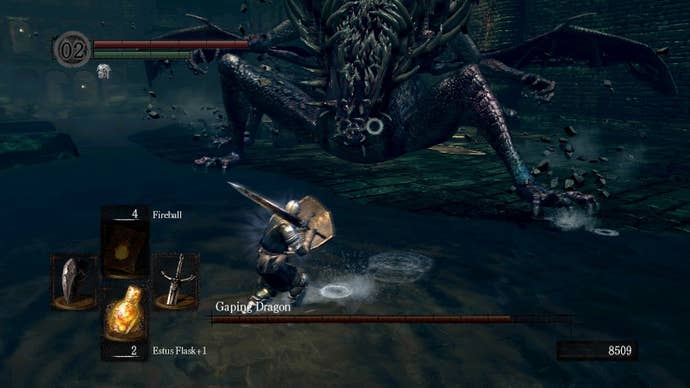
It's difficult to encapsulate every little element that makes Dark Souls the best game since 2000, so I'll do what most writers do and fall back on describing one particular moment that stands out to me. On my first run through Dark Souls, I came upon a message that had been left by another player: "Don't trust this person. Kill them." The person in question was a corpse-like figure behind bars who greeted me with a chilling, "Yee hee hee!" I killed them immediately and went on my way.
"The feeling that your actions have real consequences, whether in changing the world or simply leading to your death, brings with it that sense of impending doom that Justin Ma described - an almost suffocating terror that can make you afraid to even descend a ladder for fear of what might lie below."
Of course, if you've played Dark Souls, you probably know that the person I killed was the Female Undead Merchant. And once she was gone, she was gone. I cursed the troll who had left that message, but at the same time, I couldn't help appreciating the moment for it was - a true example of so-called 'social gaming.' It also showed in stark terms that actions have consequences in Dark Souls.
The feeling that your actions have real consequences, whether in changing the world or simply leading to your death, brings with it that sense of impending doom that Justin Ma described - an almost suffocating terror that can make you afraid to even descend a ladder for fear of what might lie below. Then you discover a boss, and your terror is heightened still further by an often massive beast whose very footsteps make the ground shudder beneath your feet. Or maybe you suddenly find yourself in a duel to the death with a random guard, nervously aware that you haven't yet spent your souls to upgrade your character.
Of course, none of this would matter if Dark Souls weren't fundamentally a damn fine action game. The pace and weight of the combat is practically perfect, emphasizing a degree of tactical thinking and skill that is rarely found in more combo heavy fare. As alluded to before, this is most apparent in the boss battles, each of which inevitably push your skills to the limit in different ways. But if it's too hard, you can always call in help with the White Sign Soapstone - a clever means by which you can dictate how hard or how easy you want Dark Souls to be.
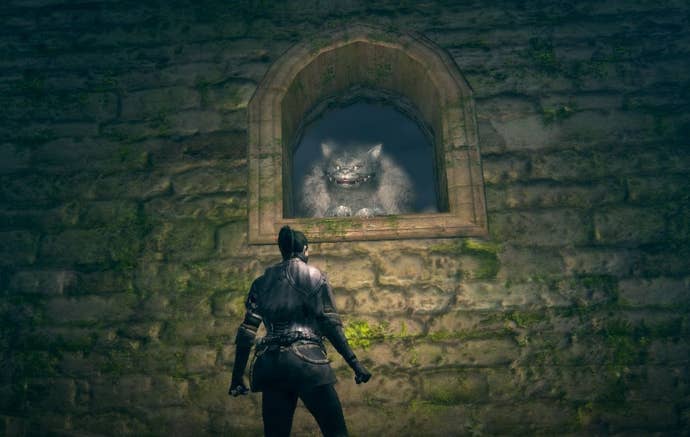
The coup de grace is Dark Souls's seamless open world, which dramatically differentiates it from its more linear predecessor. I've heard argument that the more discrete levels of Demon's Souls makes for better design, but I've felt from the beginning that the Souls games were meant to be seamless. Removing the artificial barriers naturally changes your thinking, encouraging you to explore at your own pace. If you can't beat a particular boss, there's always somewhere else to visit. I can't imagine the Souls games anyway else.
There's a great deal more to be said about the combat design in Dark Souls, the way it encourages you to find alternative routes (particularly in the case of the much hated Blighttown), and its in-depth customization, which brings with a drastically different experience in each successive playthrough. I haven't even covered its intense PvP community, which comprises its own subculture. And I feel it's important to note the way that it has evolved over the past four years, with the PC version and fan mods smoothing over many of the original release's technical hiccups.
.In the end, the proof of Dark Souls' impact and staying power is in the often fanatical fan community, many of whom still play Dark Souls to this day. Though it wasn't apparent in 2011, Dark Souls was practically made for the streaming and Youtube boom that would overtake gaming just a couple years later. Even now, its intense challenge and impactful combat makes for compulsive viewing.
At every turn, Dark Souls has defied conventional wisdom, in the process depicting video games at their smartest, their most challenging, and their most communal. It encapsulates all of the positive trends of the past 15 years, from seamless online to sandbox gameplay, and it's an incredibly well-made action game to boot. For all those reasons and more, there is no question in my mind that it is the best game since 2000.
Bob Mackey, Senior Writer
The best way to explain how Dark Souls changed my perspective can be found in John Carpenter's comedy/sci-fi/horror classic They Live. In the movie, a blue-collar Joe played by Roddy Piper stumbles upon a pair of magical sunglasses, which reveal the world's true nature: The wealthy elite are hideous aliens, subliminal messages like "OBEY" and "CONSUME" lurk behind billboard advertisements, and humanity is essentially in chains. After this, Piper can't go back to his old life--and that's exactly how I feel about my time with Dark Souls.
If this analogy is lost on you, I'll make it simpler: Discovering From Software's school of design has given me zero tolerance for Video Game Bullshit. These days, if a game scolds me for going the "wrong" way, spends hours walking me through basic actions, or displays a lack of confidence in letting me figure things out for myself, I have no problems cutting it out of my life with no regrets. For so many years, I had convinced myself tolerating these issues was just part and parcel of the video game experience. But when Dark Souls arrived in 2011, it seized me by the lapels and shouted, "No! Video games can be great again!"
Working in the game journalism trenches during Dark Souls' release gave me the chance to witness others not take too kindly to its rebellion. Of course, the persistent "Japan forgot how to make video games" narrative informed a lot of the Dark Souls blowback, but I remember plenty of peers who flat-out refused to believe anyone could possibly like it--after all, how could this even be possible in a world with Skyrim? True, Dark Souls is difficult, but that's mostly a marketing angle; its greatest strength lies in making the player responsible for their actions, and, frankly, we weren't used to that.
If anything, From Software should be credited for giving the last generation the wake-up call it needed. Thanks to HD graphics causing budgets to explode, the PS3 and Xbox 360 era really got off on the wrong foot: games had to be more accessible, safer, and take a highly recognizable form in order to recoup costs. The result? An entire generation of games that barely needed the presence of a player. Dark Souls corrected this misguided course by showing games from a different school of thought could be just as viable, and the lessons learned from its design continue to echo through the years.
Would I still be playing games if Dark Souls didn't exist? Who knows. But if I was, I'm sure they wouldn't be very good.
